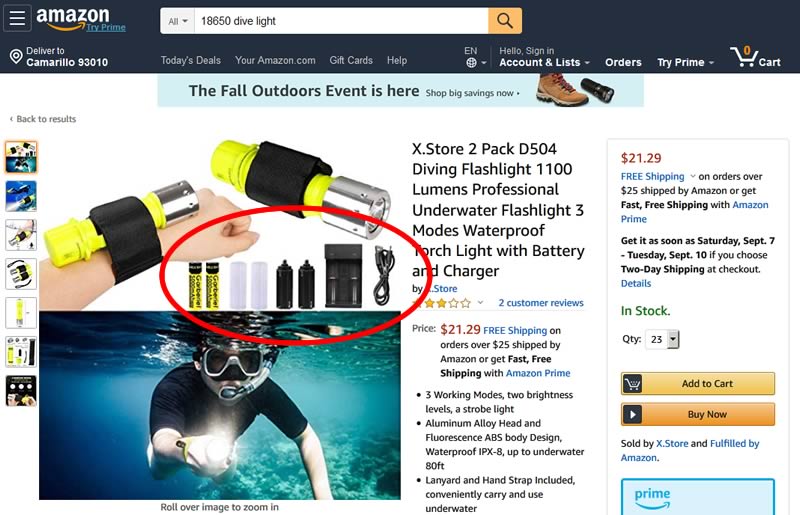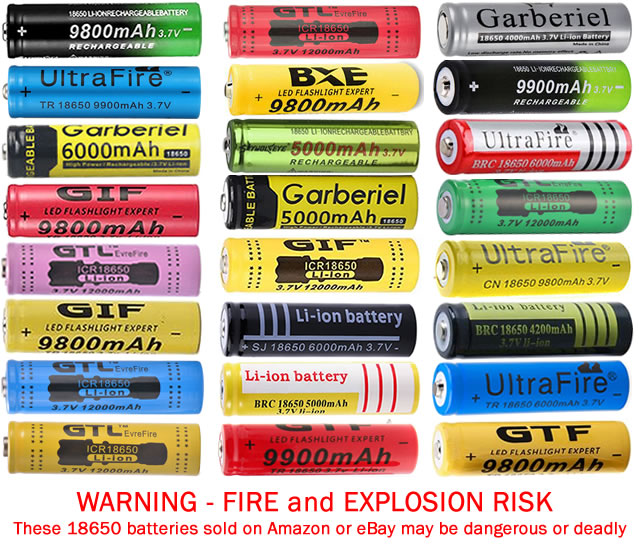Dive Boat's Designer Suspects Li-ion Batteries In Catastrophic Fire Killing 34
Fraudulent 18650 Li-ion batteries and chargers known for explosion and fire risk.
September 05, 2019, Los Angeles, CA – A tragic catastrophic fire aboard the California dive boat Conception killing 34 may have been caused by Li-ion batteries or their charger says the boats designer, Roy Hauser. “This had to have been, in my estimation, one of those lithium battery chargers,” Mr. Hauser told The Times, and "there were electrical outlets in the bunk room" added Hauser. A dive instructor notes some boats no longer allow passengers to charge devices in bunk rooms due to the fire risk.
The common Lithium-ion ("Li-ion") 18650 battery is a dangerous and potentially deadly item for unsuspecting consumers. 18650 batteries are used in laptops, flashlights, cameras, battery packs, hoverboards, e-cigarette and vape device batteries. Eight-thousand 18650 batteries power a Tesla automobile. Unscrupulous China salvagers re-label recycled unprotected batteries as "new" and sell them at cheap prices with wild capacity claims on Amazon, eBay, AliExpress, and Walmart. Fires and overheating turn them into exploding bombs with serious or deadly consequences for consumers.
For example, the current Amazon listing below offers an underwater dive light with fraudulent 5000mAh (milli-amp hour) Li-ion batteries. There are no legitimate Li-ion batteries above 3800mAh.

Few consumers understand that the batteries rarely have the built-in protective circuitry or venting claimed, which would protect against overcharging, overheating, fires, explosions or other deleterious events. If you don't use them, why should you care?
Amazon's policy prohibits the sale of all 18650 Li-ion batteries.
"Examples of prohibited listings:"
"Cylindrical lithium ion cell battery types: 14500, 16340, 18650, 20700, 21700, and 26650"
However, an online search of Amazon, Walmart, and eBay will show thousands of fraudulent 18650 Li-ion batteries, including Amazon and Walmart as a direct seller of the fraudulent and dangerous items. Written notice to Amazon and Walmart's legal department went unanswered and apparently ignored as the dangerous batteries remain.
Most 18650 battery listings highlight the energy capacity of the battery in milli-amp hours ("mAh"). Typical listings vary from 2,000 mAh to 12,000 mAh. Consumers will gravitate to the higher capacity batteries incorrectly believing they will gain the longest use. Unfortunately, most of these capacity claims are grossly exaggerated, unsubstantiated, and completely fraudulent. The space inside the battery case for electrolyte and protective components is the same, limiting legitimate manufacturers of authentic 18650 batteries to capacities under 3800 mAh. However, the dangerous and fraudulent batteries with wild capacity claims are still sold on Amazon, eBay, Alibaba's AliExpress, and Walmart.
The Counterfeit Report, an award-winning consumer advocate and counterfeit watchdog, purchased dozens of fraudulent 18650 Li-ion batteries from Amazon and Walmart as direct sellers. All the 18650 batteries tested at only a fraction of the stated capacity, some as little as 400mAh, and none contained the labeled or claimed protective circuitry. Electrical shorting and a fire occurred in one test.
All of the Amazon, eBay, and Walmart 18650 Li-ion batteries shown below are fraudulent.

A 2017 report by FEMA and the U.S. Fire Administration concludes that "Lithium-ion batteries should not be used in e-cigarettes. While the number of batteries that explode and catch fire is statistically small, the catastrophic nature of the injuries that can occur warrants the use of another battery technology for e-cigarettes."
Consumers receiving a fraudulent 18650 Li-ion battery should stop using it immediately. Do not mail, ship, disassemble, or throw the battery in the trash. Find a qualified recycler or drop-off. You may be responsible for an injury or death, and in violation of federal law. Notify the e-commerce website and the seller you received a fraudulent battery and demand a refund, or cancel the charge on your credit card or Pay-Pal account. You may have additional legal remedies.
 |